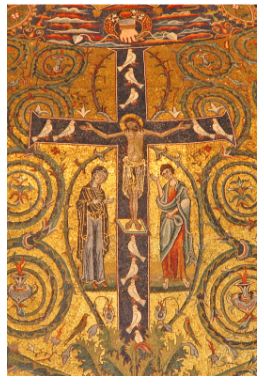Let us lift up our voices high;
Tag: Jesus Christ
Is following Christ worth it?
Is it worth it to follow Christ? Think about that for a minute – Is it worth it to follow Christ? Imagine I was sincere “seeker” asking you that question, how would you respond in concrete ways? (If your answer is yes, why? If your answer is no, why?)
Seeking Christ’s face and body, a foreign concept to many Catholics
The authority of sacred Scripture should be authoritative enough, but in case Scripture fails your logic, the Church also says that Truth is identified and lived through and with sacred Tradition and the Magisterium. More clearly: the believing Catholic holds that Truth is revealed in three inter-related pillars: sacred Scripture, Tradition and the Magisterium. One can’t have one of the pillars without the others. To do so would mean that you are Protestant.
Concerning many in the Church (catechist, laity and ordained) is the lack of understanding of who Jesus is, and His place in our lives today. Many Catholics are functional agnostics; they have no concept of who Jesus is, why He is important, and what he has to do with the Church. No surprise to me since I contend that many of the ordained can’t adequately explain matters of Christology or Sotierology (the study of Chist and the study of salvation respectively) as is evidence in their praying the Mass, preaching, their practice of the sacraments in their own lives, and their teaching in other venues. I would also contend that many of the ecclesial problems we face today are the direct result of not really knowing who Jesus is, and how to conform ourselves to His Way. The Pslams, as one example, tell us to seek the face of the Lord (the Christian would understand this to mean, seek the face of Christ). As one consequence of not knowing Jesus is the denial that we are already saved –that salvation has already happened, that the hundredfold promised by the Lord is already fulfilled. Do you know that you are saved? Do act as though you are saved or are still persisting in your sinful ways?
In the recent English edition of the L’Osservatore Romano (7 April 2010), Lucetta Scardaffia’s article “The Shroud and secularization” makes a few good points to think about when asking the questions about who Jesus is and what we face today:
“It seems incredible, but many young people do not even know that Jesus existed historically: in various countries, including Italy, today the history of Christianity no longer forms part of the school curriculum, and this leads to an ignorance that is also the result of tendencies geared to make Christianity a religion like others, with no specificity, hence leading to considering Christ as a mythical being, almost as if he were a Greek, Roman or Orienal divinity.
In international milieus — even in organizations such as the United Nations– propaganda for a mistaken concept of multiculturalism has been spreading for decades: this is proposed as a panacea for every conflict, providing that all religions be considered absolutely equal, in other words that each waives all claim to truth.
Remembering that Christianity is born from the existence in history of a man, Jesus, who said he was the Son of God, is an obstacle to the seemingly irenic fabrication because it highlights the difference of Christianity in comparison with other religions. A God who becomes incarnate to save human beings, in fact is an absolute unicum [absolutely unique], difficult to standardize.
…
The history of the birth of the individual is also interwoven with the history of the theological and sacramental significance of the Body of Christ –with the history of the sacrifice of the altar, for which the Body becomes a monstrance.
What does conversion to Christ mean?
Conversion to Christ, believing in the Gospel,
ultimately means this: to exit the illusion of self-sufficiency in order to
discover and accept one’s own need – the need of others and God, the need of
His forgiveness and His friendship. So we understand how faith is altogether
different from a natural, good-feeling, obvious fact: humility is required to
accept that I need Another to free me from “what is mine,” to give me
gratuitously “what is His.” This happens especially in the sacraments of
Reconciliation and the Eucharist. Thanks to Christ’s action, we may enter into
the “greatest” justice, which is that of love (cf. Rm 13, 8-10), the justice
that recognises itself in every case more a debtor than a creditor, because it
has received more than could ever have been expected. Strengthened by this very
experience, the Christian is moved to contribute to creating just societies,
where all receive what is necessary to live according to the dignity proper to
the human person and where justice is enlivened by love.
Seeing Jesus next to you
 We’re in the middle of the annual Vacation Bible School. About 150 kids ranging in ages 4-11 are attending the week. Each day a member of the clergy (or the seminarian) gives an explanation of the day’s Scripture passage who then ends the 5 minute lesson with a prayer. Well…
We’re in the middle of the annual Vacation Bible School. About 150 kids ranging in ages 4-11 are attending the week. Each day a member of the clergy (or the seminarian) gives an explanation of the day’s Scripture passage who then ends the 5 minute lesson with a prayer. Well…
Our Lady of Lourdes & World Day of the Sick
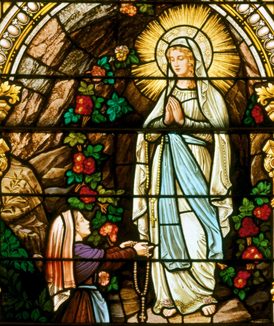 Rejoice with Jerusalem, and be glad for her, all you who love her; rejoice with her in joy, all you who mourn over her; that you may suck and be satisfied with her consoling breasts; that you may drink deeply with delight from the abundance of her glory.
Rejoice with Jerusalem, and be glad for her, all you who love her; rejoice with her in joy, all you who mourn over her; that you may suck and be satisfied with her consoling breasts; that you may drink deeply with delight from the abundance of her glory.
God of mercy, we celebrate the feast of Mary, the sinless mother of God. May her prayers help us to rise above our human weakness.
At Sunday’s Angelus the Pope spoke to the following address to the gathered people:
Today [Febraury 8, 2009] the Gospel (cf. Mark 1:29-39) — in direct continuation with last Sunday — presents us with Jesus, who after having preached on the Sabbath in the synagogue of Capernaum, cured many ill people, beginning with Simon’s mother-in-law. Entering his house, he found her in bed with a fever and immediately, taking her by the hand, he healed her and had her get up. After sunset, he healed a multitude of people afflicted with all sorts of ills.
The experience of the healing of the sick occupies a good portion of the public mission of Christ and it invites us once again to reflect on the meaning and value of illness in every situation in which the human being can find himself. This opportunity comes also because of the World Day of the Sick, which we will celebrate next Wednesday, Feb. 11, liturgical memorial of the Virgin Mary of Lourdes.
Despite the fact that illness is part of human existence, we never manage to get used to it, not only because sometimes it comes to be burdensome and grave, but essentially because we are made for life, for complete life. Precisely our “internal instinct” makes us think of God as plenitude of life, and even more, as eternal and perfect Life. When we are tested by sickness and our prayers seem in vain, doubt wells up in us and, filled with anguish, we ask ourselves: What is God’s will?
It is precisely to this question that we find an answer in the Gospel. For example, in the passage of today we read: “He cured many who were sick with various diseases, and he drove out many demons, not permitting them to speak because they knew him” (Mark 1:34). In another passage from St. Matthew, it says: “He went around all of
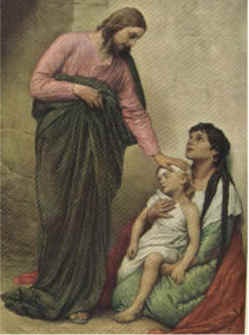 Jesus does not leave room for doubt: God — whose face he himself has revealed — is the God of life, who frees us from all evil. The signs of this, his power of love are the healings that he carries out: He thus shows that the
Jesus does not leave room for doubt: God — whose face he himself has revealed — is the God of life, who frees us from all evil. The signs of this, his power of love are the healings that he carries out: He thus shows that the
Thanks to the action of the Holy Spirit, the work of Jesus is prolonged in the mission of the Church. Through the sacraments, it is Christ who communicates his life to the multitude of brothers and sisters, as he cures and comforts innumerable sick people through so many activities of health care service that Christian communities promote with fraternal charity, thereby showing the face of God, his love. It is true: How many Christians all over the world — priests, religious and laypeople — have given and continue giving their hands, eyes and hearts to Christ, true physician of bodies and souls!
Let us pray for all the ill, especially for those who are most grave, and who can in no way take care of themselves, but depend entirely on the care of others; may every one of them be able to experience, in the solicitude of those who are near to them, the power of the love of God and the richness of his grace that saves us. Mary, health of the sick, pray for us.
Experience: the capacity to comprehend & love in the thought of Luigi Giussani
Experience
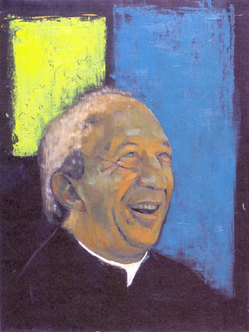 In 1963, Cardinal Giovanni Battista Montini, (later Pope Paul VI, wrote a letter to Fr Giussani in which he raised some questions about the primacy given to experience in the high school youth group Gioventù Studentesca (cf M Camisasca, Comunione e Liberazione. Le origini [Communion and Liberation. The origins], San Paolo, 2001). Father Giussani answered the questions in a booklet entitled precisely L’esperienza (Experience) in November 1963. In August 1964, Pope Paul VI wrote in his encyclical Ecclesiam suam: “The mystery of the Church is not a truth to be confined to the realms of speculative theology. It must be lived, so that the faithful may have a kind of intuitive experience of it, even before they come to understand it clearly” (no 37).
In 1963, Cardinal Giovanni Battista Montini, (later Pope Paul VI, wrote a letter to Fr Giussani in which he raised some questions about the primacy given to experience in the high school youth group Gioventù Studentesca (cf M Camisasca, Comunione e Liberazione. Le origini [Communion and Liberation. The origins], San Paolo, 2001). Father Giussani answered the questions in a booklet entitled precisely L’esperienza (Experience) in November 1963. In August 1964, Pope Paul VI wrote in his encyclical Ecclesiam suam: “The mystery of the Church is not a truth to be confined to the realms of speculative theology. It must be lived, so that the faithful may have a kind of intuitive experience of it, even before they come to understand it clearly” (no 37).
At the beginning of the history of the Movement, the method that was developed to sustain the proposal for living the charism, which is Communion and Liberation, was precisely defined, furnishing a very valuable tool for living the present in greater awareness, a present that is so full of risk because of the ever-recurring danger of reducing experience to sentimentalism or moralism, especially at a time when everything seems to end up in nothingness out of a widespread insecurity. This is the complete opposite of the certitude that arises from the encounter with Christ. It is for this reason that some of Giussani’s ideas on
Experience are offered here (which later became a chapter of The Risk of Education).
Experience as the Development of the Person
There was a time when the person did not exist, hence what constitutes the person is a given; it is the product of another.
This original condition is repeated at all levels of the person’s development. The cause of my growth does not coincide with me, but is other than me.
Concretely, experience means to live what causes me to grow.
A person grows as a result of experience; that is, the valorization of an objective relationship.
Nota Bene: “Experience” connotes the fact of becoming aware of one’s growth, in two basic aspects: the capacity to comprehend and the capacity to love.
a) A person is first of all consciousness, a being that is aware. It follows that experience is not the doing or the setting up of relationships with reality in a mechanical way. This is the mistake implied in the phrase “to have an experience,” where “experience” becomes synonymous with “trying something out.”
What characterizes experience is our understanding something, discovering its meaning. To have an experience means to comprehend the meaning of something. This is done by discovering its link to everything else; thus experience means also to discover the purpose of a given thing and its function in the world.
b) It is also true, however, that we are not the creators of meaning. The connection that binds something to everything else is an objective one. Therefore, true experience involves saying yes to a situation that attracts us; it means appropriating what is being said to us. It is composed of making things our own, but in such a way that we proceed within their objective meaning, which is the Word of an Other.
True experience mobilizes and increases our capacity to accept and to love. True experience throws us into the rhythms of the real, drawing us irresistibly toward our union with the ultimate aspect of things and their true, definitive meaning.
Nature as the Place of Experience
We give the name “nature” to the place where those objective relationships that develop a person take place: nature is the locus of experience.
Characteristically, nature weaves an organized, multi-leveled fabric that awakens the need for unity immanent in each one of us.
This fundamental need finds a correspondence in our affirmation of God, for God is precisely the unitary meaning which nature’s objective and organic structure calls the human consciousness to recognize.
Error in Human Experience
The need for unity that animates the conscious life of the person must struggle against divisive forces present in humanity, forces that drive him to disregard objective connections and to tear apart the organic structure of nature’s tapestry, isolating each single aspect of it.
Because of the human being’s need for unity, isolating each relationship or aspect inevitably turns each relationship into an absolute. All of this blocks the dynamic, evolutionary relationship of the person with reality, creating a series of disjointed pieces that are abnormally affirmed.
This tendency to separate and isolate gives all sorts of typical and inadequate connotations to the word experience, among which are an immediate reaction to things, the multiplication of links through the mere proliferation of initiatives, a sudden attraction or disgust for the new, an insistence on our own designs or plans, insisting on memories of the past that have no value in the present, or even referring to a particular event in order to block aspirations or stunt ideals.
God’s Mystery Revealed in the Field of Human Experience
The role of Christ and the prophets in history was to announce with absolute clarity that God is the ultimate implication of human experience, and that therefore the religious sense is an inevitable dimension of an authentic, exhaustive experience.
But Christ’s exceptional nature does not lie so much in the fact that His presence calls us to acknowledge that implication as in the fact that His very coming constitutes the physical presence of the ultimate meaning of history.
There cannot be an exhaustive, full, human experience without the valuation, whether conscious or not, of its relation with the event of Christ-Man.
The objective relationship that we spoke of earlier which fulfills the person no longer takes place only in nature, for with the advent of Jesus there is also a “super-natural” place; its development is in the Church, the Mystical Body of Christ.
Christian Experience
The Christian experience and that of the Church are one, single, vital act, in which a triple factor is at work, as follows:
a) An encounter with an objective fact which has an origin independent of the person having the experience. The existential reality of this fact or event is a community that can be documented, like every reality which is fully human. This community has an authority expressed through a human voice in judgments and directives, constituting criteria and meaning.
All forms of Christian experience, even those lived in the innermost recesses of the soul, refer in some way to an encounter with the community and to its authority.
b) The ability to properly perceive the meaning of that encounter. The value of the fact which we encounter transcends our power to understand so much so that an act of God is required for an adequate understanding. The same gesture by which God makes His presence known to humanity in the Christian event also enhances a person’s potential for knowledge, raising him up to the exceptional reality to which God attracts him. We call this the grace of faith.
c) An awareness of the correspondence between the meaning of the fact that we encounter and the meaning of our own existence, between the reality of Christ and the Church and the reality of our own person, between the encounter and our own destiny. It is the awareness of this correspondence that brings about the growth of the self, an essential component of experience.
Above all, in the Christian experience one sees clearly that in an authentic experience, human self-consciousness and capacity for criticism are engaged, and that this is very different from a mere impression or a sentimental echo.
It is within this verification of Christian experience that the mystery of the divine initiative exalts human reason. Freedom is at work in this verification. We cannot register or recognize the glorious correspondence between the presence of the mystery and our dynamism as human beings unless we have first accepted and are fully aware of our own radical dependence, of the fact that we are “made.” This awareness constitutes our simplicity, purity of heart, the poverty of spirit.
The drama of our freedom is entirely contained in this poverty of spirit, a drama so deep that when it happens, it is nearly hidden.
Haight speech about Christ muzzled
The Church has judged that Jesuit Father Roger Haight’s writings are beyond the limits of orthodox theological reflection on the nature of Christ (Christology).
Either one is a Catholic theologian teaching orthodox theology or you don’t teach. The problem with Father Haight is that Church’s objectivity is reduced to school yard monitor and while he is an ordained Catholic priest, Haight very rarely celebrates the Mass. AND then there is his own admission that he considers himself not a Catholic theologian but a Christian theologian. I suppose that’s what you get when a Catholic priest destined to teach priesthood candidates is educated by the Baptists. The objectivity of the Faith means something: one, holy, catholic and apostolic for starters.
Once asked if he would revise his thinking/publications sentire cum Ecclesiae so that he could be missioned by the Jesuits to teach, Father Haight told two scores of Jesuit seminarians that he would not do so. I guess that is what is called by many Jesuits “loyal opposition to the Church.” Of course, if you understand the Church to be a sacrament founded by Christ then saying no to the Church is saying no to Christ. Does this remind you of a conversion story from the Acts of Apostles where the protagonist in the narrative hears said: “…why are you persecuting me?”
Sandro Magister’s article
The 2004 CDF notification on Jesus, Symbol of God
As Jesuit Father Gerald O’Collins once said: “I wouldn’t give my life for Roger Haight’s Jesus. It’s a triumph of relevance over orthodoxy.” Neither would I, would you?
The name of Jesus is light, food, power
Saint Bernard of Clairvaux offers a power witness to the name of Jesus. Today’s feast of the Holy Name of Jesus is a good time to consider the words of Bernard as food for the soul.
I recognize now the name hinted at by Isaiah: “My servants are to be given a new name. Whoever is blessed on earth in that name will be blessed by the Lord, Amen.” O blessed name, oil poured out without limit! From heaven it pours down on Judaea and from there over all the earth, so that round the whole world the Church proclaims: “Your name is oil poured out.” And what an outpouring! It not only bathes the heavens and the earth, it even bedews the underworld, so that all beings in the heavens and the earth, it even bedews the underworld should bend the knee in the name of Jesus, and that every tongue should
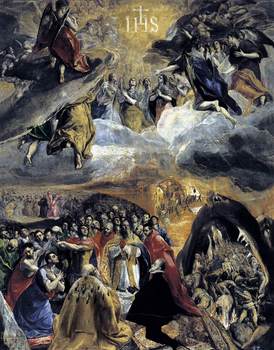 acclaim: “Your name is oil poured out.” Take the name of Christ, take the name of Jesus; both were infused into the angels, both were poured our upon men, even upon men who rotted like animals in their own dung. Thus you became a savior both of men and beasts, so countless are your mercies, O God. How precious your name, and yet how cheap! Cheap, but the instrument of salvation. If it were not cheap it would not have been poured out for me; if it lacked saving power it would not have won me. Made a sharer in the name, I share too in its inheritance. For I am a Christian, Christ’s own brother. If I am what I say, I am the heir of God, co-heir with Christ. And what wonder if the name of the Bridegroom is poured out, since he himself is pour out? For he emptied himself to assume the condition of a slave.
acclaim: “Your name is oil poured out.” Take the name of Christ, take the name of Jesus; both were infused into the angels, both were poured our upon men, even upon men who rotted like animals in their own dung. Thus you became a savior both of men and beasts, so countless are your mercies, O God. How precious your name, and yet how cheap! Cheap, but the instrument of salvation. If it were not cheap it would not have been poured out for me; if it lacked saving power it would not have won me. Made a sharer in the name, I share too in its inheritance. For I am a Christian, Christ’s own brother. If I am what I say, I am the heir of God, co-heir with Christ. And what wonder if the name of the Bridegroom is poured out, since he himself is pour out? For he emptied himself to assume the condition of a slave.
Did he not even say: “I am pour out like water”? The fullness of the divine life was poured out and lived on earth in bodily form, that all of us who live in this body doomed to death may receive from that fullness, and being filled with its life-giving odor say: “Your name is oil poured out.” Such is what is meant by the outpouring of the name, such its manner, such its extent.
By why the symbol of oil? I have yet to explain this. In the previous sermon I had begun to do so when another matter that seemed to demand mention suddenly presented itself, though I may have dallied with it longer than I intended. In this I resembled the valiant woman, Wisdom, who put her hand to the distaff, her fingers to the spindle. Skillfully she produced from her scanty stock of wool or flax a long spool of thread, out of which she wove the material that made warm clothes for the members of her household. The likeness between oil and the name of the Bridegroom is beyond doubt, the Holy Spirit’s comparison of the two is no arbitrary gesture. Unless you can persuade me otherwise, I hold that the likeness is to be found in the threefold property of oil: it gives light, it nourishes, it anoints. It feeds the flame, it nourishes the body, relieves pain: it is light, food, medicine. And is not this true too of the Bridegroom’s name? When preached it gives light, when meditated it nourishes, when invoked it relieves and soothes.
How shall we explain the world-wide light of faith, swift and flaming in its progress, except by the preaching of Jesus’ name? Is it not by light of this name that God has called us into his wonderful light, that irradiates our darkness and empowers us to see the light? To such as we Paul says: “You were darkness once, but now you are light in the Lord.” This is the name that Paul was commanded to present before kings and pagans and the people of Israel; a name that illumined his native land as he carried it with him like a torch, preaching on all his journeys that the night is almost over, it will be daylight soon -let us give up all the things we prefer to do under cover of the dark; let us arm ourselves and appear in the light. Let us live decently as people do in the daytime. To every eye he was a lamp on its lamp-stand; to every place he brought the good news of Jesus, him crucified. What splendor radiated from that light, dazzling the eyes of the crowd, when Peter uttered the name of the strengthened the feet and ankles of the cripple, and gave light to many eyes that were spiritually blind. Did not the words shoot like a flame when he said: “In the name of Jesus Christ of Nazareth, arise and walk”? But the name of Jesus is more than light, it is also food. Do you not feel increase of strength as often as you remember it? What other name can enrich man who meditates? What can equal its power to refresh the harassed senses, to buttress the virtues, to add vigor to good and upright habits, to foster chaste affections? Every food of the mind is dry if it is not dipped in that oil; it is tasteless if not seasoned by that salt. Write what you will, I shall not relish it unless it tells of Jesus. Talk or argue about what you will, I shall not relish it if you exclude the name of Jesus. Jesus to me is honey in the mouth, music in ear, a song in the heart.
Saint Bernard of Clairvaux
Sermon 15 on the Song of Songs.
Holy Name of Jesus
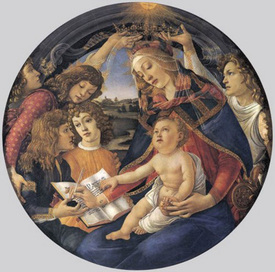 Lord, may we honor the Holy Name of Jesus enjoy His friendship in this life and be filled with eternal joy in His Kingdom, where He lives and reigns with You and the Holy Spirit, one God, for ever and ever.
Lord, may we honor the Holy Name of Jesus enjoy His friendship in this life and be filled with eternal joy in His Kingdom, where He lives and reigns with You and the Holy Spirit, one God, for ever and ever.
Jesu Dulcis Memoria
Jesu, the very thought of thee
With sweetness fills my breast;
But sweeter far thy face to see,
And in thy presence rest!
Nor voice can sing, nor heart can frame,
Nor can the memory find
A sweeter sound than thy blest name,
O Savior of mankind!
O hope of every contrite heart!
O joy of all the meek!
To those who fall, how kind thou art,
How good to those who seek!
But what to those who find? Ah this
Nor tongue nor pen can show:
The love of Jesus, what it is,
None but his lovers know.
O Jesu, light of all below!
Thou Fount of life and fire!
Surpassing all the joys we know,
And all we can desire!
Thee will I seek, at home, abroad,
Who everywhere art nigh;
Thee in my bosom’s cell, O Lord,
As on my bed I lie.
With Mary to thy tomb, I’ll haste,
Before the dawning skies,
And all around with longing cast
My soul’s inquiring eyes;
Beside thy grave will make my moan,
And sob my heart away;
Then at thy feet sink trembling down,
And there adoring stay;
Nor from my tears and sighs refrain,
Nor those dear feet release,
My Jesu, still from thee I gain
Some blessed word of peace!
A Vespers hymn by Saint Bernard of Clairvaux (12th century)
The feast of the Holy Name of Jesus has been celebrated in various places since the fifteenth century and was extended to the whole Catholic Church 20 December 1721 by Pope Innocent XIII but it was a devotion of many holy men and women before this time. There are antecedents which indicate that the faithful’s veneration of the Holy Name was encouraged Saint Bernard of Clairvaux, Saint Bernardine of Siena and Saint John Capistrano. Various religious orders had their dates for the observance of this feast. Sadly, one of the reforms of the Second Vatican Council was to excise the feast from the liturgical calendar thinking that the Holy name was honored enough in the Divine Office and that the Mass texts were reduced to a Votive Mass. When Pope John Paul II published the third edition of the Roman Missal in 2002 he restored the feast to the liturgical calendar as an optional memorial on the first free day after January 1st, that is January 3rd.
 By the time of Saint Ignatius of Loyola and his companions, the newly of priests chose the name of Jesus by which they would identify themselves. With the pope’s permission the Loyola called his groups the Company of Jesus, translated into Latin to be the Societas Iesus, hence the Society of Jesus. The image adopted was Saint Bernardine’s IHS monogram. The observance of the feast of the Holy Name of Jesus, with its Votive Mass, set the tone of mission of the Company of Jesus. As a side note, the Votive Mass of the Holy Name of Jesus was one the Masses offered for the repose of the soul of Avery Cardinal Dulles at the University Chapel at Fordham. The devotion still is observed in the Society of Jesus.
By the time of Saint Ignatius of Loyola and his companions, the newly of priests chose the name of Jesus by which they would identify themselves. With the pope’s permission the Loyola called his groups the Company of Jesus, translated into Latin to be the Societas Iesus, hence the Society of Jesus. The image adopted was Saint Bernardine’s IHS monogram. The observance of the feast of the Holy Name of Jesus, with its Votive Mass, set the tone of mission of the Company of Jesus. As a side note, the Votive Mass of the Holy Name of Jesus was one the Masses offered for the repose of the soul of Avery Cardinal Dulles at the University Chapel at Fordham. The devotion still is observed in the Society of Jesus.
Does your parish have a Holy Name Society? If not, why not ask the pastor to begin one. See the US confraternity’s webpage.
